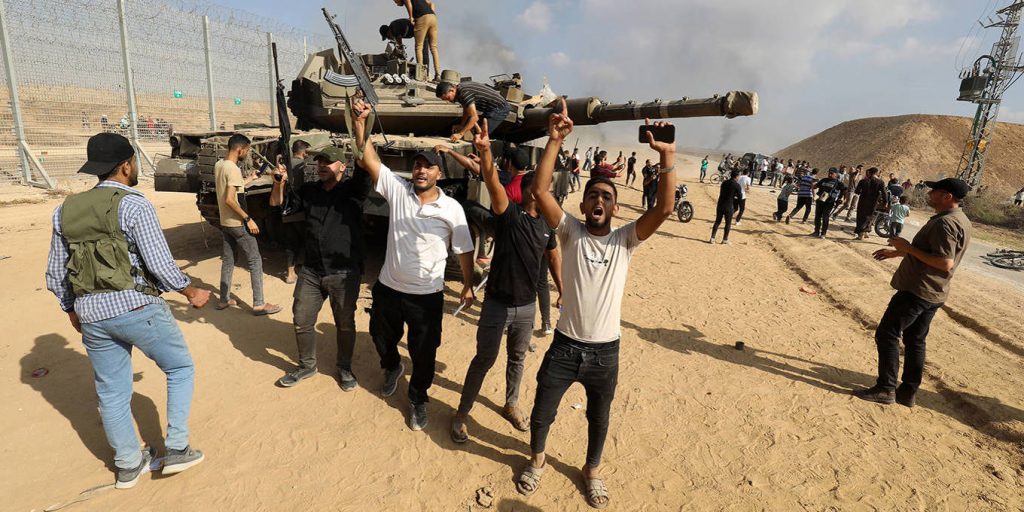IN THE MEDIA
How Israel’s internal divisions helped spark the bloody Hamas massacre
October 12, 2023 | Tzvi Fleischer

Sydney Morning Herald – 11 October 2023
There seems little doubt that the intense divisions inside Israel over controversial judicial reform proposals over the past year – leading to unprecedentedly large protests against Benjamin Netanyahu’s government on a weekly basis – were a contributing factor that led Hamas to plan and then launch its brutal attacks on Israel on Saturday.
In April, former Israeli national security adviser and major general Yaakov Amidror warned that Iran was pushing Hamas and Hezbollah “to act more boldly” against Israel because Tehran believed the months of protests against the Netanyahu government were evidence that the country was weak.
And indeed, Iran has repeatedly said over the past year that Israel is ripe to be destroyed. Just last week, Iranian Supreme Leader Ayatollah Ali Khamenei tweeted about Israel: “The usurper regime is coming to an end.”
Moreover, credible reports are now appearing, sourced to senior members of Hamas and Hezbollah, that Iran’s Revolutionary Guard Corps was directly involved in preparing the attack. The reports say the corps organised meetings in Beirut with Hamas, Hezbollah and other proxies to finalise the details of Saturday’s mass attack across the Israel-Gaza border. Further, it’s claimed that Tehran gave the final go-ahead for these attacks on Monday last week.
Iranian and Hamas perceptions of Israel as weak, vulnerable and divided were almost certainly strongly encouraged by repeated warnings inside Israel that the Israel Defence Forces’ military readiness was being compromised by thousands of key reservists refusing to report for voluntary duty and training in protest against the judicial reform proposals.
We do not yet know if the protests, and refusal of the reservists to report for duty, were major contributors to the catastrophic intelligence failure and breakdown of Israeli defence systems around Gaza that allowed Hamas to overrun 22 towns and villages and massacre more than 900 Israelis, most of them civilians. This certainly will come under severe scrutiny when the reasons for these catastrophic failures – arguably the worst intelligence and defence debacles in Israel’s history – are studied in coming months.
For now, Israelis are still profoundly shocked and united in grief and horror. While these events are being equated to the September 11 attacks in the US in 2001, the impact is even deeper because Israel is such a small country, with only 9 million citizens. Today, there is overwhelming agreement that nothing else matters but burying and mourning the dead, seeing what can be done to rescue the hostages Hamas seized, and dealing with the severe threat from Hamas and other Iranian proxies.
Politically, Israel appears to be moving towards an emergency national unity government, including both the government and leaders of the protest movement. Netanyahu has called for this, and the two key opposition leaders, Yesh Atid party leader Yair Lapid and National Union party head Benny Gantz, also agree in principle.
The most serious sticking point will be whether the most controversial and extreme of Netanyahu’s partners in his right-wing coalition – National Security Minister Itamar Ben Gvir of the Otzma Yehudit party and Finance Minister Bezalel Smotrich of the Religious Zionism party – would be part of such a unity government. Lapid has said he would not join a unity government that includes them. Netanyahu may not be averse to dropping them if offered a viable alternative – he has struggled to control them, as both have made a habit of loudly courting controversy and headlines, often to Israel’s detriment.
No matter what happens on this front, judicial reform will almost certainly disappear as a major controversy in Israel for a considerable period, and perhaps permanently. Both the government and Israeli society will be focusing on an existential security crisis and will have their hands full with an intense war, likely to last weeks or months, with Hamas. And afterwards, there will be a need to rebuild Israel’s shattered security doctrines and systems.
Moreover, once the fighting subsides, the current government is likely to get much of the blame for the terrible security and intelligence debacle that occurred on its watch. There is virtually no chance the parties in it will have an opportunity to return to their judicial reform agenda.
However, the fundamental political and communal divides in Israeli society that the judicial reform controversy exposed, between religious and traditional communities and more secularist Israelis, are highly unlikely to simply disappear. Instead, they are likely to re-emerge in new ways.
The weekend’s events certainly marked a major watershed in Israel’s history and politics. Israel is likely to be a substantially different country, with a very different political configuration, in their wake. But it is simply too early to speculate on exactly what that will look like.
Dr Tzvi Fleischer is editor of the Australia/Israel Review, published by the Australia/Israel & Jewish Affairs Council. He has a PhD in international politics from Monash University.
Tags: Hamas, Hezbollah, Iran, Israel, judicial reforms





